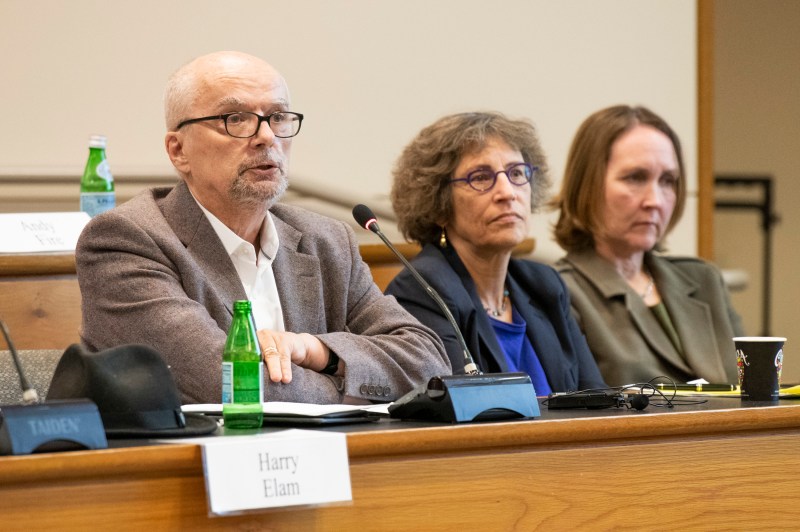In its fourth and final meeting of the quarter, the Faculty Senate heard a panel addressing the nuances of free speech and academic freedom on campus.
The panel began with a presentation from Stanford Law professor Jenny Martinez, who clarified regulations and limits of the First Amendment. She focused on identifying what she sees as common misconceptions regarding the First Amendment and speech issues at Stanford, citing prior court cases to justify her points.
The first misconception Martinez addressed was the idea that the First Amendment constrains how Stanford can respond to speech on campus. She said the First Amendment does not legally determine what action Stanford can take against speech because Stanford is a private institution.
“Stanford protects free speech and First Amendment values as part of its commitment to academic freedom,” she added.
Martinez said speech permissible under the First Amendment is limited by contextual factors, even when the Amendment itself is applicable. Specifically, she cited time, place and manner regulations as well as regulations regarding harassment and threats.
However, she added that California’s Leonard Law does place certain limits on Stanford’s control over speech on campus. For instance, she said Stanford is not allowed to punish students simply for engaging in “hate speech.”
Martinez cited the 1995 court case Corry v. Stanford University, which successfully challenged an interpretation of the Fundamental Standard that utilized the “fighting words” exception of the First Amendment to restrict language viewed as bigoted by the University.
School of Humanities and Sciences Dean Debra Satz followed Martinez, clarifying the difference between the concepts of academic freedom and freedom of expression.
In particular, Satz said that while people expect the government to take a hands-off position for speech in the public square, there is still a question of whether the same norms should apply to universities.
She cited a definition by the American Association of University Professors (AAUP), which states that “academic freedom upholds not the absolute freedom of utterance of the individual scholar, but the absolute freedom of thought, of inquiry, of discussion and of teaching of the academic profession.”
Satz noted that this definition refers to the rights of the profession as a whole and not individual scholars, reflecting the nature of the academic profession as one in which it is not just appropriate but also important to judge ideas.
“We are in the business of setting standards on the speech and writing and expression of our peers,” she said. “We hire and we tenure people on the basis of the quality of their ideas as judged by peer review.”
In accordance with this oversight of ideas, Satz said speech must be regulated in ways that allow for effective teaching and learning. However, she also said she recognizes the importance of confrontation with dissenting ideas, arguing that education is designed to push students out of their comfort zones and that it is therefore important for classrooms not to limit expression simply because it may offend others.
“At Stanford, the problem we have is not so much that professors are silencing students but that students are silencing themselves,” she said. “There is a huge tendency to conformity and to not want to upset people by taking opinions that might go against [others’ views].”
Education Professor Emeritus Eamonn Callan also expressed concern at students suppressing their own speech when engaging with politically controversial topics in the classroom. He emphasized the need for people to maintain open minds regarding beliefs with which they may disagree, and he discussed the role of faculty specifically in helping realize this mission.
“Many [students] lack the skills required for civil dialogue among intellectual adversaries. Good teaching can and should address this problem,” he said. “I don’t believe we can contribute much to cultivating the cardinal intellectual virtue of open-mindedness unless we are forthright in bringing disciplinary as well as relevant political and moral controversies into our classrooms.”
Callan said classroom environments ought to exhibit civility and not deference. While he characterized deference as evasion of controversy or simple submission to authority, he said civility is showing mutual respect and making fair assessments without condescension or anger.
“The sharp cut and thrust of intellectual disputation is not suppressed by civility,” he added. “It is only tempered by norms that focus our discourse on shared academic ends and safeguard the dignity of all who participate.”
In assessing the extent of professors’ roles in managing speech outside the academic setting, Satz brought up the example of student-invited speakers. She said it is difficult to make decisions about which outside speakers should or should not be invited.
Recently, the Stanford College Republicans’ (SCR) invitation of controversial conservative filmmaker Dinesh D’Souza sparked campus backlash, including two petitions calling for the Associated Students of Stanford University (ASSU) to deny funding to the event and for the Office of Community Standards to investigate SCR. On Tuesday, the Undergraduate Senate rejected SCR’s request of $6,000 to fund D’Souza’s visit, on the grounds that the request included $1,624 towards the purchase of alcohol.
Callan pointed out that, while the Fundamental Standard cannot be utilized to penalize “despicable” speech, it should act as a measure of ethical responsibility. He postulated that complacent confidence in the civility of campus discourse may lead students and faculty to pay less attention to the Fundamental Standard than is warranted by the realities of discourse.
In terms of speech that violates academic norms, Callan cited effective counterspeech as a crucial tool.
“If we are as committed to the Standard as we ought to be, then we must respond with loud and cogent counterspeech against the most grave violations,” he said.
Contact Sean Chen at kxsean ‘at’ stanford.edu and Emily Wan at emilywan ‘at’ stanford.edu.
